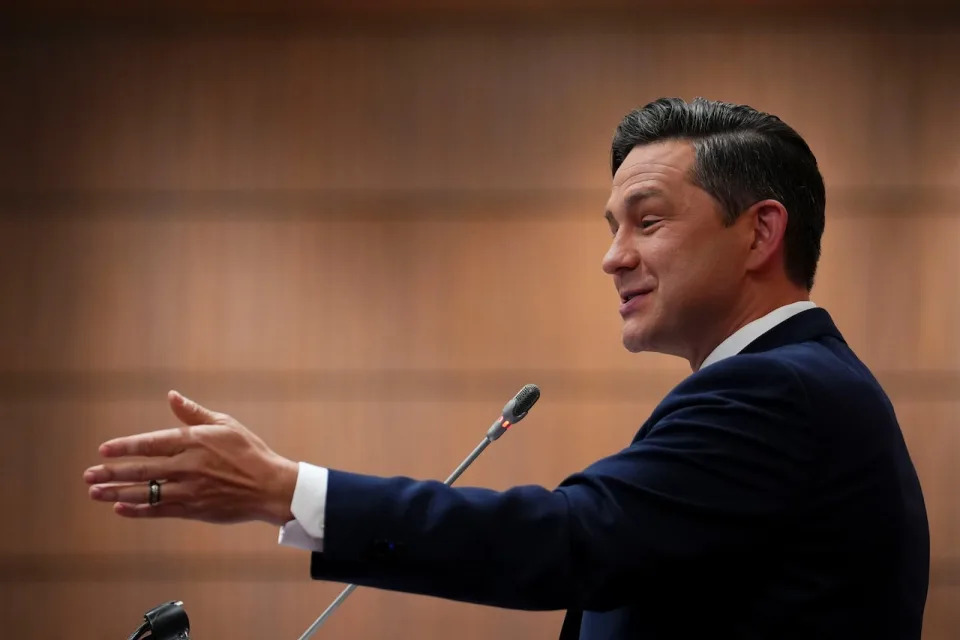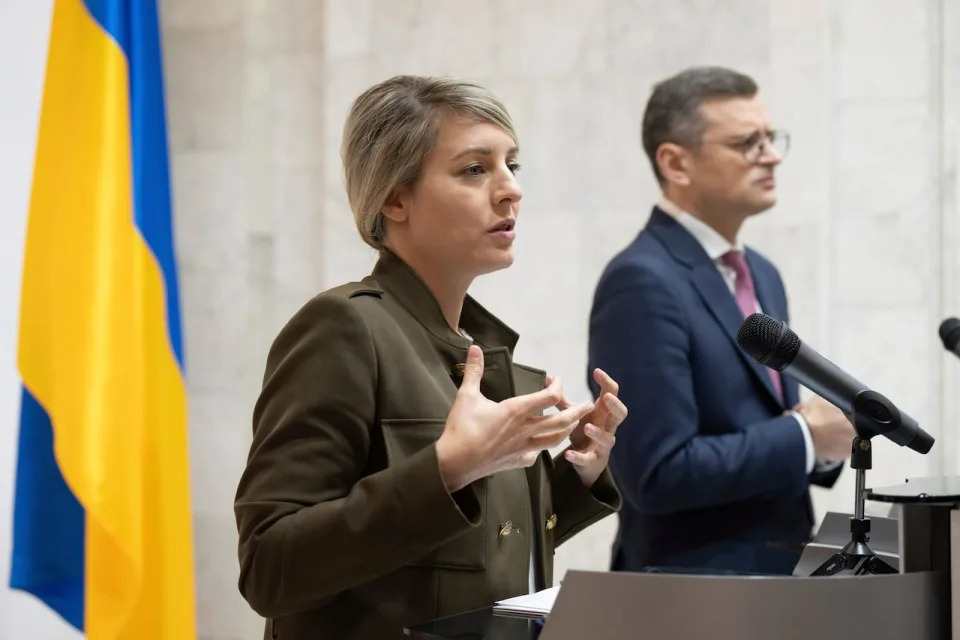CBC
Tue, February 6, 2024

This photograph, shared by Ukrainian President Volodymyr Zelenskyy on the social media platform X on Wednesday, Jan. 31, 2024, shows Ukrainian prisoners of war reacting after a prisoner exchange at an undisclosed location in Ukraine.
As the grim two-year anniversary of Russia's full-scale invasion of Ukraine approaches, a new poll suggests Canadians' engagement with the conflict is waning and support for Ukraine is weakening — especially among Conservatives.
A survey released Tuesday morning by the Angus Reid Institute says a quarter of Canadians believe Canada is offering "too much support" to Ukraine in its fight, up from 13 per cent who said the same thing in May 2022.
Conservative supporters are a driving force behind that result, according to the poll.
The percentage of Canadians who voted for the Conservative Party in the last election, and who now say Canada is doing too much to assist Ukraine, has more than doubled — from 19 per cent in May 2022 to 43 per cent now — according to the public opinion research group's findings.
"It's ... a massive jump," said Shachi Kurl, president of Angus Reid Institute. "This has the potential to be something of a political Gordian knot for Pierre Poilievre."
Sorting out the reasons behind the shift is largely an exercise in speculation at this point, said Kurl.
On the one hand, she said, there's a longstanding tradition of support for the military among Conservative voters. That position may be in tension with Conservative support for small governments and lower taxes, she added.
"I don't want to overemphasize it … but what is burgeoning, what is starting to sort of grow from out of the weeds into a fairly healthy seedling here, is this almost the Trump-esque, 'Canada First' mentality," she said.
"That mindset of conservative is not representative of the majority of the Conservative Party base in the country, or the entirety of the base. It is a minority, but it is a passionate, vocal and growing minority."
The poll suggests the belief that Canada is giving Ukraine too much is also growing among NDP and Liberal voters. The percentage of voters who think Canada is doing too much for Ukraine jumped from 5 to 10 per cent among 2021 Liberal supporters, and from 5 to 12 per cent among 2021 NDP supporters.
Since early 2022, the federal government has committed more than $2.4 billion in military assistance and more than $352 million in humanitarian aid to Ukraine.
An emotional debate about trade with Ukraine
The poll landed a day after another emotional debate in the House of Commons over a bill to implement an update to the Canada-Ukraine free trade deal.
The Liberals accused Conservative Leader Pierre Poilievre and his party of abandoning Ukraine when Conservative MPs voted against the bill in November. Prime Minister Justin Trudeau has attributed the opposition to "American MAGA-influenced thinking."
Poilievre, whose party has maintained a large polling lead over Trudeau's Liberals for months, has said his party still supports Ukraine and its objection is to the mention of "carbon pricing" in the legislation.

Conservative Leader Pierre Poilievre address the national Conservative caucus on Parliament Hill in Ottawa on Sunday, Jan. 28, 2024.
Conservative Leader Pierre Poilievre addresses the national Conservative caucus on Parliament Hill in Ottawa on Sunday, Jan. 28, 2024. (Sean Kilpatrick/Canadian Press)
"I really think it speaks to how pathologically obsessed Trudeau is with the carbon tax that, while the knife is at the throat of Ukrainians, he would use that to impose his carbon tax ideology on those poor people," Poilievre said in November.
The trade agreement imposes no obligation on the Ukrainian government to introduce a carbon tax.
Last week, Poilievre called on the Liberal government to donate to Ukraine tens of thousands of surplus air-to-ground rockets that are slated for disposal.
The Angus Reid poll suggests Canadians, by a three-to-one ratio, believe the Conservatives' vote against the Canada-Ukraine free trade agreement will undermine Canada's reputation on the world stage. Half of likely Conservative voters believe there will be no effect at all, the poll says.
Kurl said elections based on foreign policy issues are rare in Canada, but for the first time in months Poilievre's opponents have something to talk about.
"He's spent little to no time on the defence and it has enabled him to stay very disciplined in terms of message and stay very focused in terms of a relentless attack on the government. And I'm not saying that those attacks in some cases haven't been cogent, or that they haven't been the result of really a litany ... of own-goals on the part of this government," said Kurl.
"But, you know, for the first time we we may be seeing something that puts Poilievre on the defence ..."
Canadians' interest dwindling
The Angus Reid Institute's survey suggests the number of Canadians closely following news of the conflict has dropped from 66 per cent in May 2022 to 45 per cent now.
"Overall, Canadians are checking out of this conflict," said Kurl.
"And you can see that those who are less engaged are much more likely to also say, you know, we're helping too much, we've fulfilled our commitments."
The poll suggests Canadians remain divided on the role Canada should play in the war going forward.
One third of respondents agreed Canada should support Ukraine "as long as it takes," while one-in-ten believe that support should continue for only another year.

Foreign Minister Melanie Joly speaks to the media during a press conference with Ukraine's Foreign Minister Dmytro Kuleba in Kyiv, Ukraine on Friday, Feb. 2, 2024.
Another 30 per cent are uncertain, while 20 per cent say they believe the war should end now with negotiations for peace initiated by Ukraine.
Just five per cent of respondents want Canada to end its support entirely.
The Angus Reid Institute conducted the online survey from Jan. 29 to Jan. 31, 2024 using a randomized sample of 1,617 Canadian adults who are members of Angus Reid Forum.
For comparison purposes, a probability sample of this size would carry a margin of error of plus or minus two percentage points, 19 times out of 20.
Ukraine is so desperate for arms, it's itching to get its hands on Canada's 83,000 decommissioned rockets
Kwan Wei Kevin Tan
Mon, February 5, 2024

A Ukrainian general is asking Canada for its decommissioned CRV7 ground attack rockets. A spokesperson for the Canadian military told Global News that the 83,303 rockets were pending disposal.
One man's trash is another man's treasure.
Canada has decommissioned over 83,000 CRV7 ground attack rockets.
Ukraine now hopes Canada will give them the decades-old rockets instead of disposing of them.
Ukraine's military spy chief is asking Canada for its decommissioned rockets to replenish its dwindling supply of arms.
"We need a lot of equipment, both ammunition, munitions in general, artillery munitions — lots of types of equipment," Kyrylo Budanov told Canadian media outlet Global News in a report published on Monday.
Budanov, who heads Ukraine's military intelligence, has his sights set on Canada's decommissioned CRV7 ground attack rockets.
A spokesperson for the Canadian military confirmed with Global News that they have 83,303 CRV7 rockets that are pending disposal.
But the Canadians have yet to hand over the rockets, as they had concerns over the safety and stability of the decades-old CRV7s.
A representative for Canada's defense minister, Bill Blair, told Global News they needed to ensure that the CRV7s were "operationally effective and safe to transport to Ukraine before any potential donation."
"We have no concerns," Budanov said in response to the Canadian's apprehensions.
The Ukrainians aren't the only ones grappling with arms shortages. Their foes, the Russians, had to turn to the North Koreans for missile launchers and ballistic missiles.
Ukraine has been heavily reliant on Western support for its war efforts. The US has provided over $43 billion in security aid to Ukraine since Russia invaded them in February 2022.
Representatives for Canada's Department of National Defence did not immediately respond to a request for comment from Business Insider sent outside regular business hours.
Olena Goncharova
Mon, February 5, 2024

Kyrylo Budanov, the chief of Ukraine's military intelligence (HUR), hopes that Canada could hand over to Ukraine tens of thousands of rockets that are awaiting demolition at one of the country's military bases.
More than 83,000 CRV7 ground attack rockets are warehoused at Canadian Forces Ammunition Depot Dundurn, south of Saskatoon. Canada no longer has any use for them, and has selected a private contractor to demolish the rockets.
Speaking with the Global News outlet, Budanov said donating the rockets will help Ukraine fend off Russian forces and save Canadian taxpayers the cost of destroying them.
The CRV7s would be deployed in Ukrainian attack helicopters and ground launchers to target Russian tanks and artillery, according to the intelligence chief. Ukraine has engaged in discussions with Canada on this matter but is still awaiting a decision.
Canada's opposition Conservative Party has asked the government to send decommissioned rockets to Ukraine instead of destroying them, according to the CBC report on Feb. 2. Canada's Department of National Defense has confirmed that the donation is under consideration.
Canadian officials mentioned they were examining the request but raised concerns about the age of the CRV7s, suggesting they could have become unstable over the decades, posing risks during handling and transportation.
Experts who talked to the Global News pointed out that rocket propellant has a finite lifespan and may become unstable after many years. However, given that CRV7s use solid fuel, they might still be considered safe if stored correctly and not exposed to moisture or contamination.
The Canadian government has committed more than $1.7 billion in military assistance to Ukraine since Russia's full-scale invasion on Feb. 24 2022, which includes missiles as well as ammunition for small arms, artillery and battle tanks.
Read also: Canada-Ukraine security agreement could be finalized in weeks, Canadian FM says
Ukraine seeks Canadian aid with decommissioned CRV7 missiles
The New Voice of Ukraine
Tue, February 6, 2024

CRV7 is a Canadian unguided aerial missile
Kyrylo Budanov, head of the Ukrainian Military Intelligence (HUR), urged Canada to provide decommissioned CRV7 missiles to counter Russian threats, as reported by Global News on Feb. 5. These missiles are vital for Ukrainian attack helicopters and ground launchers to deter Russian tanks and artillery.
While discussions between Ukraine and Canada continue, Canadian officials express concerns over the outdated nature of CRV7s and potential safety risks during use and transport. However, experts suggest that proper storage can mitigate these risks.
Read also: Poland gears up for further military aid to Ukraine
As tensions escalate along the eastern border, Canada’s Department of National Defense considers including CRV7 missiles in a future military aid package to Ukraine.
This potential aid reflects Ukraine’s determination to defend its sovereignty against Russian aggression, pending diplomatic negotiations.
South Korea donates 10 demining machines to Ukraine in humanitarian gesture
Germany unveils new military aid package for Ukraine, including tanks, drones, and communication terminals
Ukrainska Pravda
Tue, February 6, 2024

Photo: Ministry of Infrastructure
Canadian businesses are considering launching investment projects to develop Ukraine's transport sector.
Source: Ministry of Communities, Territories and Infrastructure Development following a meeting between Minister Oleksandr Kubrakov and Canada’s Ambassador to Ukraine Natalie Tsmoc
Details: The purpose of the meeting was to discuss the main priorities for the recovery and development of Ukraine's transport sector and to attract private capital.
"We already have a solid track record of cooperation, in particular within the framework of the Support to Ukraine's Reforms for Governance (SURGe) project funded by the Government of Canada. Together with experts, we formulate and implement state policy on recovery, regional development and decentralisation.
At the same time, the transport sector remains one of the most attractive sectors for investment despite the war – we are focusing our attention on increasing the export capacity of land transport and waterways, both in the long and short term," Kubrakov said.
According to the ministry, Canada is currently considering investing into the following parts of the transport sector:
Rail transport, including multimodal transport;
The modernisation of Ukrainian Black Sea ports;
Development of land border crossings;
Assistance in the rapid resumption of civil aviation;
Shipbuilding
CBC
Sun, February 4, 2024

(Submitted by Wayne Easter - image credit)
P.E.I. is helping Ukraine rebuild its economy by sharing its expertise in a field it is known for around the world — growing potatoes.
Razom Invest Canada, a P.E.I.-based company headed by former Malpeque MP Wayne Easter, began teaching Ukrainians how to plant and harvest potatoes on a large scale last year.
Easter said the idea came about in 2022 at a Rebuild Ukraine conference in Toronto.
"The prime minister of Ukraine spoke there and he said this: He said the economic front is as important as the military front in terms of Ukraine's future, and businesses and Canadian investors need to be in Ukraine now."

An early crop of potatoes from a field in Luhyny, Ukraine.
An early crop of potatoes from a field in Luhyny, Ukraine. (Submitted by Wayne Easter)
Potatoes are a food staple in Ukraine, but there is currently a shortage there because of the war with Russia.
"They imported something like 40 per cent of their potatoes from Belarus, and they're not on good terms [with] Belarus at the moment, so that's opened up some opportunity," Easter said in an interview with Island Morning host Mitch Cormier.
The first crop was grown and harvested in the town of Luhyny, in western Ukraine, with the help of equipment brought in from the Netherlands.
But there was a glitch. Easter said they couldn't use P.E.I. seeds because of the ongoing export restrictions imposed by the Canadian Food and Inspection Agency.
So they were forced to buy their seed from Scotland. It yielded a crop "equivalent to one of the better crops on Prince Edward Island" that is in storage and being sold into the local food chain, he said.
Razom is now hoping to expand to other farming industries in Ukraine in hopes of developing further trade relations.
"Prince Edward Island has a lot of expertise in the agriculture area," Easter said.
Easter spent about 40 days in Ukraine, and his partner about 100. He said the Ukrainian farmers are eager to continue the project.
He plans to go back to the country in March to help plan for the upcoming planting season.
"It was a real joy to work with the Ukrainian people and to work with the people on the farm.... There's an agrologist on this farm we're working, and to see his smile and be so proud of this crop…."
The war with Russia is mainly in the eastern part of Ukraine, but it limits what can be done with their cash crops along the Black Sea. But Easter said many grocery stores are stocked similar to how they are in Canada.
"Ukrainians are getting on with their lives, and, yes, there are air raid sirens, and, yes, there's missiles coming into the west, and it is a country at war. But they're getting on with their lives and the West has to be there in every way they can be to help the Ukrainians out."
No comments:
Post a Comment